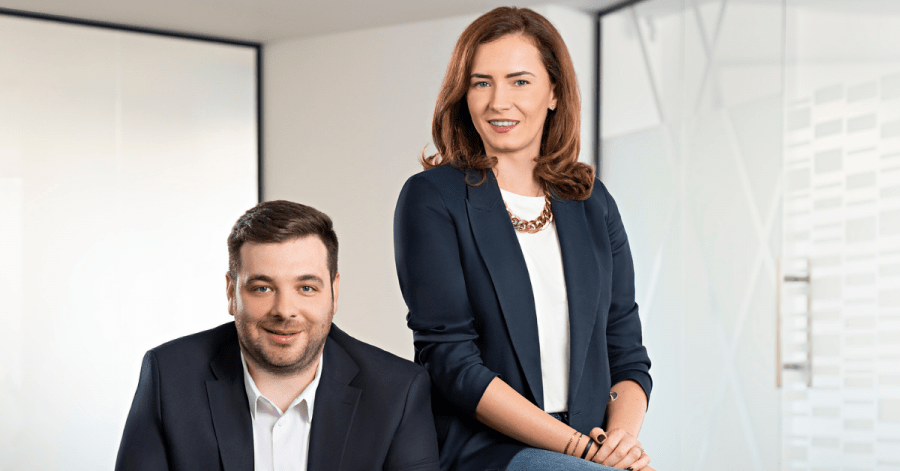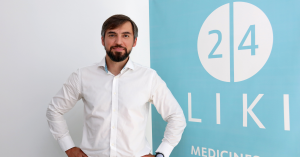UPDATE: This week, SanoPass announced launching a collection of 10K health utility NFTs, called SanoCubs, on the Elrond blockchain. Each ‘health avatar’ comes with a bundled subscription that unlocks benefits with wellbeing providers in Romania: 10 consultations of general and internal medicine, access to 100 fitness workouts, plus telemedicine and AI-powered symptoms checker. The collection will launch on April 1st at a 2EGLD mint price and with a pre-sale round for the whitelisted community.
We’ve explored applications of the metaverse and blockchain before, from gaming to fashion and proptech. Another use case appeared on our radars recently: healthcare. SanoPass, a Romanian healthcare and wellness startup, has been tapping into these emerging technologies for a while, and is preparing to launch a metaverse platform for healthcare.
Much like other sectors, healthcare is undergoing a digital transformation aimed to reshape the way medical data is stored and shared, how we interact with healthcare professionals, and how decisions are made. The global digital health market size is projected to grow almost fourfold between 2019 and 2025, from $175 billion to $657 billion.
Some of the most pressing challenges healthcare systems are facing in this transition are keeping patient data safe and private, sharing medical records, and tracking medical goods in the supply chain and delivery, among others.
Blockchain, while not a panacea, is known for its ability to enable secure data sharing and access between numerous parties. In short, it can improve security and interoperability of digital health data in a highly fragmented market, reduce costs, and improve the overall experience. Add to that the lower and lower adoption barriers, as most blockchain solutions are now offered as a software-as-a-service, requiring minimum knowledge about the technology.
To learn more about the applications of blockchain in healthcare, The Recursive talked to SanoPass Managing Partners Delia Iliasa and Andrei Vasile. SanoPass offers a platform for healthcare and fitness services and subscriptions for companies and individuals, connecting users to private clinics for preventive medicine, as well as to gyms.
One interesting use case of blockchain that SanoPass aims to bring in the local market are smart contracts. These are essentially shared digital contracts through which healthcare providers can access a single version of the contract on a blockchain ledger, as well as track the transaction of goods and services, and payment settlements. In the US, companies such as Chronicled and Curisium offer this type of system to reduce disputes over changes in the contracts in the industry.
The Recursive: What did you aim to bring in the local healthcare system when you launched SanoPass?
Delia Iliasa: What we bring in the healthcare ecosystem is experience, because both of us are highly experienced in working in healthcare and wellness. We also wanted to bring simplicity – to make things simple for the user. Every time we look at a new development, we have this frame in mind: is it easy enough for the user?
Andrei Vasile: Our main values are simplicity and transparency. SanoPass started in 2019, as a pure B2B platform addressing the major pain points of the traditional healthcare and wellness system in Romania.
In the last three years, we created a digital portal for healthcare and wellness services, offering a single point of access, proximity, and simplicity. Our beneficiaries, which can be the employees of the companies with whom we are working or private individuals, benefit from this digitization and the ecosystem we have built. We successfully decreased the time to medical visit from an average of seven days to a maximum of 48 hours, thanks to the wide network and coverage in Romania and the Republic of Moldavia, and very soon in Bulgaria. We are currently working with more than 10,000 medical providers.
A second major pain point that we are covering is the proximity and instant gratification. We are using the technology of Microsoft, Google and other ecosystems with whom we are integrated, to offer a geolocalisation module that facilitates access to the closest partner, as soon as possible. So, you are able to find the first available slot for your needs in your proximity.
Last but not the least, we want to offer freedom of choice. Many times we’ve been compared with Airbnb, Booking or Uber, platforms where you have freedom of choice to select any provider based on your own individual needs.
Delia Iliasa: There are two patterns of usage in the medical world. One pattern is acute pain – I need to see the doctor now, and then proximity and instant gratification are the answers – I need the fastest possible consultation. The other pattern is having a recurrent problem, or a chronic disease, where I need a connection with my doctor. What we address first is primary care and the idea that I need to serve the patient now.
I think one of the facts that differentiated us was looking at the interests and the needs of the users. We are people who have been using medical services and people who have trained in fitness centers, and we start from what is best for the users.

What is the business model of SanoPass?
Delia Iliasa: We have a subscription model. You have access to a certain number of services for a monthly payment, and you usually pay less than the cost of those services.
The additional benefit is the fact that having that subscription puts into your mind the idea that you should be more careful with your health. So, you have the added benefit and the added value of actually having the opportunity to educate and to promote a healthy lifestyle for your subscribers.
Then, we are able to bundle up services, not necessarily only medical visits, but also fitness services, which means that I can only pay for one provider – SanoPass – and have access to a multitude of providers across the country and across the nearby countries.
What was the uptake in the market so far?
Andrei Vasile: We started in 2019 as a pure B2B, with focus on SMEs. Once launched, we realized that the time to contract was not as we imagined in the business plan. The market reality was different. We saw that we needed to understand the clients better, as well as how we can accommodate the digital platform for them in order to offer a complementary product to the existing subscription or existing medical insurance.
In the same year, we sold a couple of thousands of subscriptions and we prepared the buyer persona and the entire sales process. 2020 was a very difficult year because of the pandemic. It was also the year in which we pivoted, tested our subscription for the B2C market, and accommodated our pure B2B platform for individual consumers. After that, we saw an increase in the adoption of subscriptions.
This year, we saw the results of our work so far. We finished 2021 with 50,000 subscriptions issued and more than 30,000 users enrolled in our platform. And once we also launched the wellness part, we saw a significant increase in revenue – we doubled our figures in the last quarter, and we saw an increase in adoption and engagement (from two sessions per month to almost seven sessions per month).
Delia Iliasa: I think one of the things worth mentioning is the fact that from our B2B database, we are not losing clients. The volume is not necessarily at the level we want it to be, and that’s why we are going to intensify our sales efforts the next few months, but once they try SanoPass, they stick to it. And we’ve seen that two of the key retention factors are the simplicity of use and the freedom of choice.
What are the objectives with the new fundraising round? Do you expect existing investors to participate?
Delia Iliasa: We already had two rounds of financing, pre-seed and seed, in 2020 and 2021. The common thread between them has been the support of Cleverage VC, the only healthcare-dedicated VC in Romania. We have open discussions both with them and with other previous investors but it’s too early to say more, as we’ve just announced our intention of raising funds.
Our main target is to accelerate our growth. We’re going to invest a lot in people, we’re going to grow our sales team, and we will continue promoting the SanoPass idea.
We have a large network of partners, both medical clinics and gyms. We are also working now on the third pillar of our strategy – nutrition, and part of the money will go into development.
Finally, we are focusing on giving more value back to this network of partners. These are things that we haven’t yet communicated officially. We want to help our partners be more efficient, generate more revenue and get more visibility. For instance, we started with an educational podcast. It is entirely produced by SanoPass and it involves people from the medical network; we’re also going to expand it into fitness.
How did you decide to enter the blockchain and NFT space? What is the vision for SanoPass?
Andrei Vasile: We have been exploring these emerging technologies for some time now. Everything started from the new generation of the web, web3 and the metaverse. The growing appeal of these technologies was the main driver of our focus and our research on blockchain.
The function of blockchain that we saw in the healthcare system is mostly related to the fact that the market is highly fragmented. There is a coverage confusion and lack of digitization in the market, and customers perceive low value of the healthcare access-related and wellness services. Blockchain can address this.
It also enables the decentralization of data – data security and privacy, as well as community ownership, because once you transfer a database to the blockchain system, the information is stored in the beneficiaries’ wallets and they have ownership of their data. We are speaking about neutrality and token incentives.
Also one of the things that we have in mind is how to solve this problem with the inflation of pricing. Blockchain and the cryptocurrency environment could be a solution to hedge the price inflation and help people pay less, by paying a standard fee.
Do you have a roadmap that you can share this point?
Andrei Vasile: We have plans for the next five years; we are doing research and we are in contact with the top blockchain companies in Romania and not only. In a couple of days we will make intentions on blockchain and related technologies public, and there will also be a roadmap. As one of the first steps, we are looking to introduce the smart contracting concept in this conservative market.
Delia Iliasa: What we did was to understand what applies to our business. We want to create a bridge between the fastest-growing and most innovative technological methods and one of the domains that has been stuck in time for decades.
If you look at the way that healthcare has evolved, we have MRI machines and a lot of technology being deployed in the way that we are being examined, however, the way that we are going to the doctor, waiting in clinics, hasn’t changed much.
So, what we are looking at as a company that is situated between the patient and the provider, is how we can innovatively change the way that healthcare is being delivered to the user.
Where do you see the markets of healthcare and wellness going in the next five to ten years?
Andrei Vasile: In the next 2-3 years, I see SanoPass as the CEE leading healthcare and wellness platform that digitizes, connects, and integrates quality medical and wellness providers, not necessarily affiliated with large networks.
For the next five years, we plan to expand at least on the European level. The fact that we have a wide range of services makes it easier for us to enter a new market with new content that is targeted to a specific niche. For instance, we can launch only with the wellness component. We also don’t offer only access to the medical providers and wellness operators, but telemedicine services as well.
Delia Iliasa:
I think we’ve come to a moment where a medical provider can focus only on providing medical services, and then third party platforms step in the middle to distribute demand, in order to serve customers faster and more effectively.
I would say that the future looks like that and I think everybody will do what they are specialized to do. And what we are specialized in is facilitating access and giving people the freedom of choice.
If you look in Western Europe and maybe even across the Atlantic, you see that a lot of initiatives are appealing in this sense. The healthcare environment as we used to know it is changing and adapting to the needs of people. People are living longer. They want to live healthy, they move frequently. We no longer live in the same apartment for 30-40 years. And I would say that if we have the possibility to take with us via technological methods, the doctors that we already know and appreciate, that’s something that we should support.
In the past few weeks, some of the SanoPass team’s efforts have been diverted into supporting the people that are fleeing Ukraine. With support from the partner Emerald Medical Center, they implemented a medical helpline with a Ukrainian speaking doctor, whose family is in Ukraine. Together with a Ukrainian-speaking team of volunteers, they answer calls on a 24 hour basis. Anyone can access the service by calling +40311310048.








